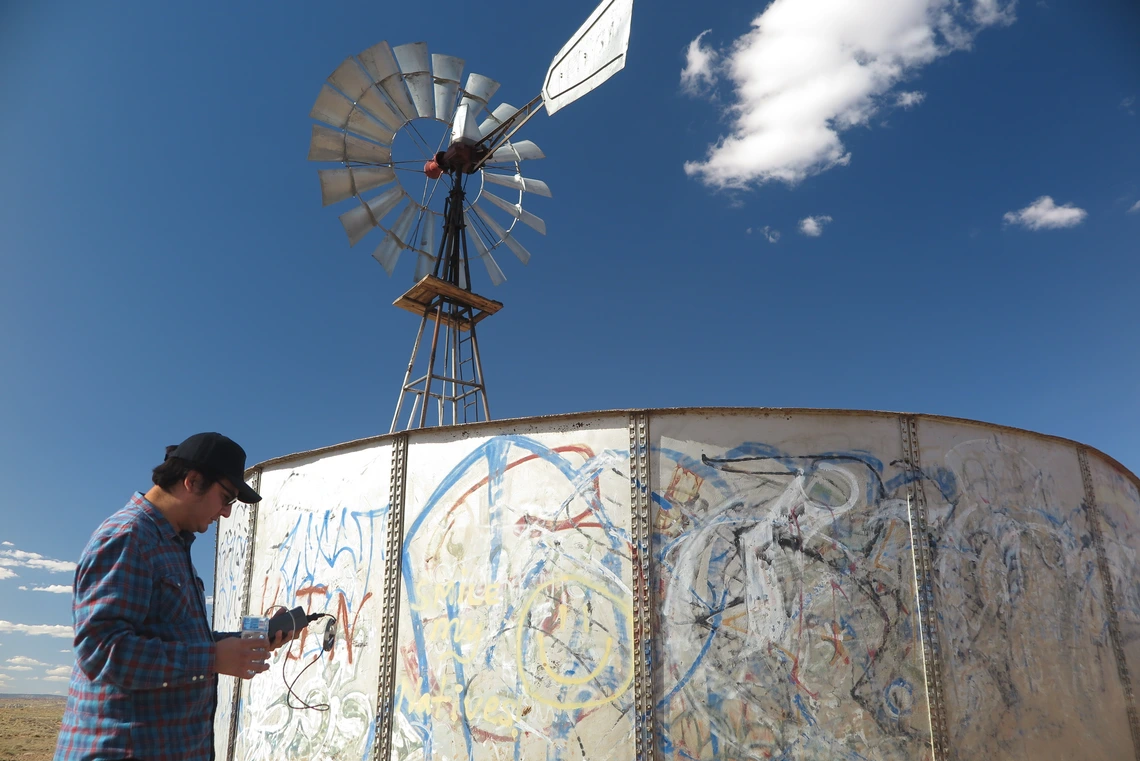Christopher B. Yazzie, Diné College, Class of 2012

Photo by Torran Anderson
Christopher B. Yazzie is a member of the Navajo Nation. He is Tó’adheedlíinii (Water Flows Together clan), born for Bííh Bitoodnii (Deer Spring clan). He was born and raised in the Navajo Nation and is from Tuba City and Dinebito Dam, Arizona. Yazzie is currently pursuing a PhD in chemical and environmental engineering at the University of Arizona (UA), but his higher education began at Diné College nearly a decade after graduating from Tuba City High School.
Yazzie decided to attend Diné College because of the strong emphasis on learning Navajo culture and language and the internship opportunities with the college’s Land Grand office and the Diné Environmental Institute. Every Monday, he took a three-hour, 200-plus-mile Navajo Transit bus ride from Tuba City to the main Diné College Campus in Tsaile. On Thursdays, he would take the long bus ride back to Tuba City to return to his family. On these long rides, he listened to music as he passed by homes with on-site water storage and unregulated water sources that are used by the more than 30,000 homes in the Navajo Nation without access to piped water.
He knew firsthand the effects of consuming unregulated ground water. At Diné College, he realized his career goal was to help solve tribal water issues, interning as a lab assistant and managing a greenhouse for the US Department of Energy. “It was great to learn science from home, starting with geology, biodiversity studies of plants and animals, and phytoremediation of contaminated sites due to the injustice of uranium mining issues,” Yazzie says.
In 2012, Yazzie earned an Associate of Science degree in environmental science from Diné College. Since he wanted to gain further skills to address tribal water challenges, he decided to pursue a Bachelor of Science in environmental engineering at Northern Arizona University. Even while an undergraduate, he knew he needed to continue his education by pursuing graduate school. Yazzie emailed graduate schools across the Southwest, and Dr. Bob Arnold at the University of Arizona emailed him back immediately. The correspondence led to phone calls and, eventually, to Yazzie enrolling in the Master of Science in environmental engineering program. “Bob Arnold not only opened the door for me, [but] he held the door open and kept the line of communication,” Yazzie says. At UA, Yazzie’s research focused on desalination and remediation of water impacted by heavy metal contamination.
After receiving his master’s degree, Yazzie was recruited by Dr. Karletta Chief into the NSF Research Traineeship, Indigenous Food, Energy, and Water Security and Sovereignty (Indige-FEWSS) program, which allowed him to pursue his PhD in environmental engineering. The Indige-FEWSS aims to develop the next generation of scientists and engineers to work with and within Indigenous communities to address food-energy-water challenges. The primary partner of Indige-FEWSS is his alma mater, Diné College. Yazzie has come full circle to now teach Diné College students about water filtration.
Through his work with Indige-FEWSS, Yazzie is helping the team deploy several solar nanofiltration systems in the Navajo Nation. His role in the project is the examination of heavy metal rejection using different nanofiltration membranes. In 2019, Yazzie and Indige-FEWSS brought a solar nanofiltration unit to the Diné College Land Grant office that will remain on-site as a teaching tool for future generations of water scientists.
This profile on IndigeFEWSS trainee Chris Yazzie was originally published in Volume 33, No. 1, Fall 2021 issue of Tribal College: Journal of American Indian Higher Education.
